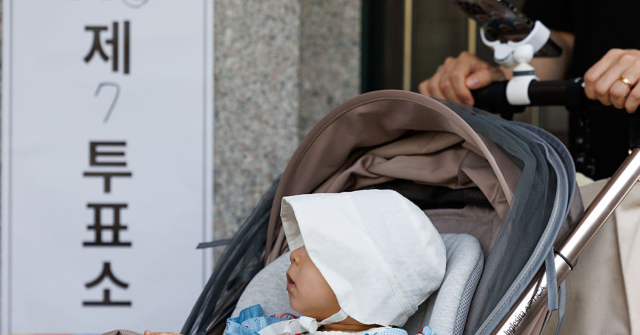Statistics Korea, the official statistical agency of the South Korean government, released data from April on Wednesday that showed the biggest year-on-year increase in childbirths since 1991.
The report showed 20,717 babies were born in April 2025, an 8.7 percent increase from births in April 2024. It was the first time in three years that South Korea logged more than 20,000 births in a month.
The overall birth rate rose from 0.06 in April 2024 to 0.79 in April 2025 — still far below the level needed for population stability, but movement in the right direction. In fact, natural deaths rose by 0.8 percent in April, so net population growth was still negative. The net population of South Korea has not grown since 2019.
“The rise in births appears to be influenced by increased marriages since last year, growth in the population of women in their early 30s, and various birth promotion policies by the central and local governments,” Statistics Korea said.
Marriages were up 4.9 percent year-on-year in April, growing for the 13th month in a row, while divorce was down 5.2 percent. Since children are rarely born outside of marriage in South Korea, marriage rates tend to be a reliable leading indicator of birth rates.
Population decline is an outright crisis in South Korea, officially acknowledged as a “national emergency” during the administration of the previous president, Yoon Suk-yeol.
The Yoon administration introduced a raft of measures to reverse the dire demographic trend, including more parental leave allowances, flexible work hours, support for child care, expanded after-school programs, and subsidies for employers who hire temporary workers while parents are on extended leave.
Yoon wanted to establish a Ministry of Population Planning to coordinate the government’s response to the demographic crisis, but his plans were derailed by partisan infighting, difficulties getting government appointees confirmed, and ultimately the red-alert political crisis that erupted after Yoon attempted to impose martial law in December 2024.
Yoon was impeached and eventually removed from office after his martial law effort failed. He was replaced by a president from the opposition party, Lee Jae-myung, in a special election this month.
Lee said during his campaign that he planned to address the population crisis with subsidized loans, income tax deductions for parents, plus an increased supply of affordable rental housing for young families. Yoon was not given much credit for his policies seeming to have a positive effect during the fiery end of his administration, and there is some debate over precisely how much good they did since marriage and childbirth appeared to improve modestly after the infection panic of the Wuhan coronavirus pandemic.
Lee’s focus on tax deductions might have been inspired by a February 2025 study from Oxford University that pegged massive tax increases in the 1970s as an early cause of South Korea’s demographic decline.
The study found that doubling South Korea’s value-added tax (VAT) from ten to 20 percent dramatically reduced disposable income, which almost immediately led to a sharp decline in fertility. The fertility rate leveled out after taxes were reduced in the 1990s.
“The fertility rate in South Korea has fallen from 6 in 1950 to less than 1 in 2023, and the observed changes in fertility over time seem to align with the shifts in South Korea’s tax policies,” noted Oxford researcher Joan Madia.
“Our research suggests that taxation can be an effective policy tool for influencing population dynamics and demographic trends and indicates that taxes targeting families and reducing child affordability are most likely to affect fertility,” Madia said.
The study found that the effects of higher taxes on fertility were much more profound than previously suspected, because young people living in a high-tax environment become nervous about their long-term financial prospects. Forced to choose between budgeting for children and spending their limited resources on “personal gratification,” they pick the latter — and young people focused on personal gratification are less likely to get married.
Lee’s proposed tax deductions are far too modest to reverse those trends. Demographic experts cautioned that in addition to a bump from the end of the pandemic, South Korea could be surfing on a wave of “echo boomers,” a surge of women born during the 90s who are entering their prime years for marriage and motherhood. That wave will inevitably subside when the daughters of the low-birthrate 2010s come of age.
South Korea, like most of the industrialized world, is government by high-taxation statists and left-wingers who would never dream of introducing the kind of dramatic across-the-board tax reductions and government spending cuts that might make young people feel enthusiastic about bringing children into a future of unlimited growth. The best they can do is “tax relief” that really amounts to targeted subsidies by another name, shifting government funds around instead of giving wealth back to those who earned it. Such schemes simply cannot outweigh the costs young people anticipate for getting married and having children.
Read the full article here
